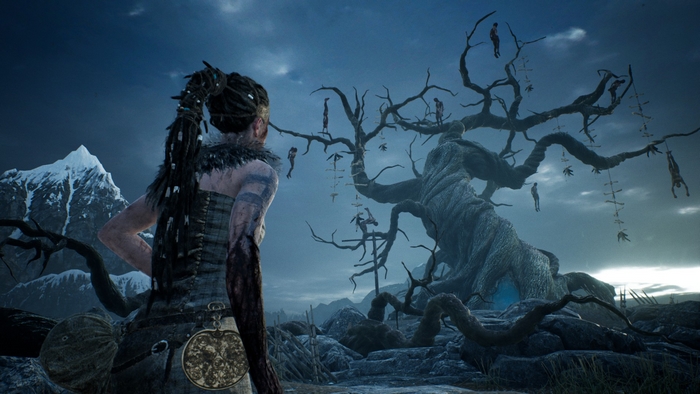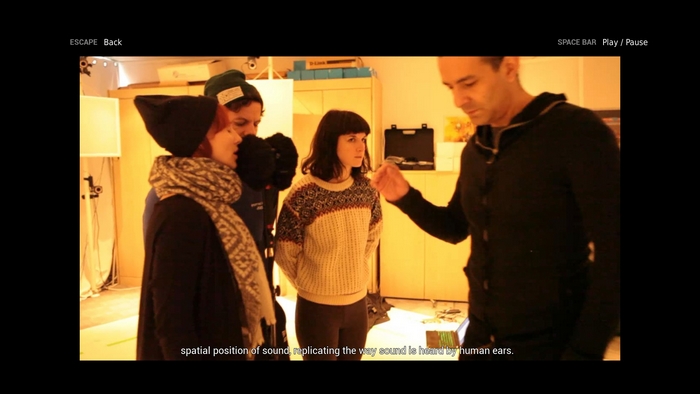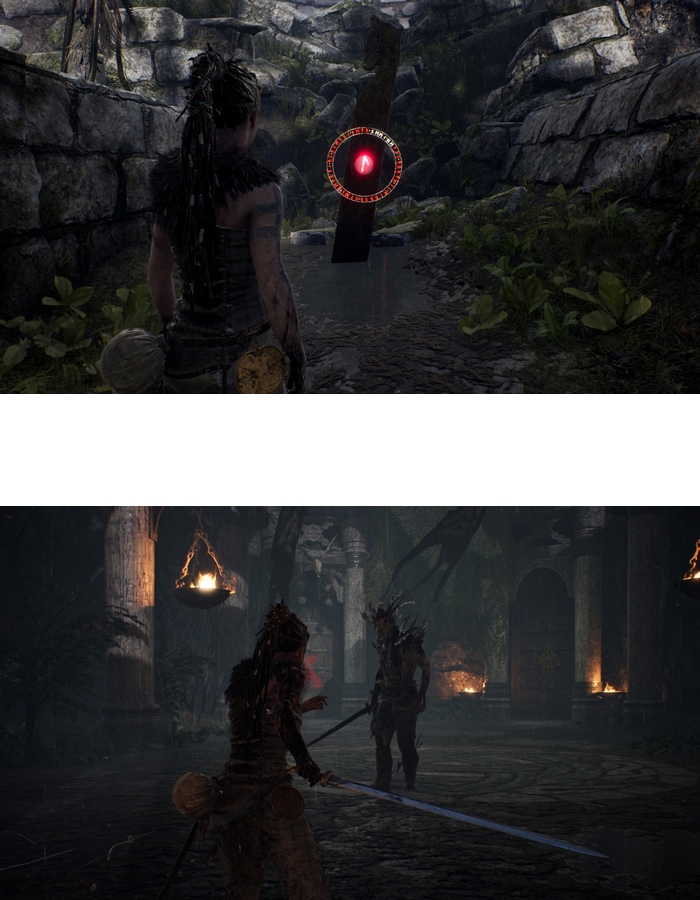Hellblade: Senua's Sacrifice
Review
Introduction
"Hello, who are you? …It doesn’t matter. Welcome. You are safe with me. I’ll be right here, nice and close so I can speak without alerting the others. Let me tell you about Senua. Her story has already come to an end but now, it begins anew."
Hellblade: Senua's Sacrifice is a solo action/adventure TPS game with horror elements. It is made by the Ninja Theory team, an independent studio that is not particularly well known. Bought in 2018 by the giant Microsoft, they previously made Enslaved: Odyssey to the West in 2010, and one of the games from the Devil May Cry series, DmC: Devil May Cry, in 2013.
Also edited by them (except for the Xbox port), the game is directed and written by Tameen Antoniades. The game first came out on PC on the 8th of August, 2017, after being announced at 2014's Gamescom. It runs on Unreal Engine.
The game is about Senua, a female Pict warrior. It all starts when the protagonist is on her way to Helheim – the Celtic equivalent of the afterlife – with the head and thus the soul of her deceased lover, Dillion.
Of course, there is a bit more about Senua. She is a geilt. Senua suffers from a severe form of psychosis, worsened by some heavy trauma. This includes the massacre of her loved one while she was a recluse in the forest, pushed away by her own community, who saw in her the source of all evil and hoped that it would cleanse her.
Oh, yeah... Senua also suffers from powerful hallucinations, mainly auditory. She is getting hit constantly by voices that comment on everything. One of them breaks the fourth wall and plays the role of the narrator. At least you know from the beginning that it will not be a restful trip.
Among the impaled corpses as soon as you arrive and the voices that come to you from nowhere, the term "horror" starts to take on all its meaning.

The Story
“Strike vengeance from your heart, Senua, as there is always a heavy price to pay.”
There are not many games that talk about mental health. When they do, it is not always realistic or done in a good way. In Hellblade, it is clearly the main subject and it is done well. Through Senua, the game lets us experiment with an unusual conflict: a fight against ourselves, against our own darkness. And while we are going through our way, we sink more and more into the psychosis.
Furthermore, there is something else that will not be helping. Senua hears voices, which she calls Furies, that will go all along with you through your adventure. Those voices are particularly talkative, and they won't hesitate to comment on every one of your actions, whether in good or bad ways. We can hear them joking about us, giving us confusing tips, and leading us astray. Weirdly enough, they are also very useful during fights, alerting us of enemies at our back and advising us as much as they can. Even more impressive, one of them is aware of you and will take on the role of narrator. Breaking the fourth wall, she will be the kindest of all and will play the middleman between you and Senua.
The story itself is totally based on the Celtic culture, and more particularly, the Pict/Irish one. You also get a huge load of Nordic myths and tales. While we are advancing through the game, we are getting told about divinities (Odin, Loki, Hela, etc.) and lore in general. This is done through"Lorestones" that are hidden across the game and that you will need to find. Is history more your thing than tales? Don't worry, you will also get to learn about some more realistic details, like this guy, Druth.
Who is this Druth? Well, he was that druid that we met during our exile, and he is now haunting us as well, at least sometimes. This character finds his source in Fintan of Rheinau, a real Irish guy who lived in the 9th century, was enslaved by the Vikings, escaped, and turned his back on his past to end up living as a Catholic monk in Switzerland.
The bosses are also inspired by folklore. For example, the first two that we fight are Surt, the fire giant from Nordic mythology, and Valravn, which comes from a Danish creature. If this is your kind of stuff, you will be glad you played this game.
However, even if the story is nicely done and will please the biggest fans of its setting, I do find it a bit confusing at times. While the game is only dubbed in English, subtitles are available in the option menu for those like me, who aren't fluent yet. But, to be honest, even with them activated, following everything, and focusing on both the dialogues and the endless voices from the Furies, it was hard to get everything.

The Audio
“This is what happens when you listen to the voices of the underworld. They crawl into your soul and rot you from the inside.”
My favorite part of the game! It's surely one of the strongest points here, and maybe even the biggest from my point of view! The sound ambiance is awesome thanks to the developer team using a particular technique: binaural recording. It is a bit hard to explain, but let us say that it allows a 'spatialization' of the sound. By that, I mean that it makes the sound appear in all directions and recreate the sensation of being surrounded by sounds of all kinds. The Furies seem to speak all around us, and it helps make the voices realistic. You then share a similar experience to Senua's. It's terribly efficient and scary. For optimal use, a headset is an obvious choice, and you are ready for an actual schizophrenic experiment.
The music is stupendous as well. What a shame that it is so rare; I would be willing to listen to them more often. But I can understand that the silence that sticks to us is appropriate with the heavy vibe of the game, and highlights the Furies' voices and Senua's breathing.
The audio part, overall, plays a huge part in the gameplay. For example, the voices in your head alert you when enemies are behind you, and they give you some kind of clue when solving puzzles. The sounds also help you move around in dark places. Besides that, they are accentuating the player's stress, joking about you, and attempting to lead you astray. However, they can end up being very annoying, so it would be understandable if some players would rather not bother with them.
A last note: I enjoy the work of the dubbing actors here. They worked hard to make a high-quality dub!
The Graphics
“Because even in darkness the wonder and beauty of the world never leaves. It's always there, just waiting to be seen again.”
And here it is, the second-best part of the game: the graphics! It may not be the most beautiful game ever, but the visual result is nice! The particle effect is good, as is the lighting effect, which got an appreciable upgrade from the addition of ray tracing. Unfortunately, at this time, I don't have a proper GPU to allow this option. But I do note that the option has been made available. Be careful, however; it seems to be turned on automatically since you first start playing Hellblade, which makes the game laggy as Hel(heim, haha!) for those, like myself, who do not have the correct setup.
I liked the character animations. Just like the audio counterpart, the developers used a particular recording technique. To do so, they placed a specific recording device on a real actor, who turned out to be Melina Juergens, one of the Ninja Theory developers! They even did all the recording in their own office!
The Gameplay
“Bravery only means something to those afraid of death. Senua's fear runs far, far deeper.”
So, Hellblade is an action-adventure game. However, the adventure part is way more present here. There are primarily two phases: puzzles and fighting. Those last ones aren't as frequent, and it is a shame. I do think it is the most interesting part. Do you remember Skyrim? If you thought that it was some kind of walking simulator, I have bad news for you...
The puzzle part is indeed the biggest one in Hellblade. You will have to walk from one area to another, seeking a way to keep moving. Most often, you will need to find the same runes that are written on the doors, hidden somewhere in the landscape. To do so, you will have to find the right place while looking at the right angle, then use the focus skill from Senua to reveal the hidden rune.
I must admit that Senua is clearly not a sprinter. Most of the time, we will simply walk. At best, with the Shift key, you will be able to trot. Were you hoping for Usain Bolt? Too bad... The game is slow-paced, telling you the story in a slow way. The action-addicted players will probably get bored fast. And even worse, Hellblade turns out to be quite repetitive. Unfortunately, don't get your hopes up about any kind of new features, as there won't be many through the game. We are mostly solving the same type of puzzles over and over without much variation.
The fights are actually really cool and epic. Though, don't expect to go full berserk and attack without thinking. Otherwise, you may just get knocked out. You will have to be at least a bit clever and avoid being hit while taking advantage of the ground, mostly to not get surrounded. You also have at your disposal a variety of moves: fast but light or slow but powerful attacks, a kick strike that can destabilize the enemy, dodging... You are also able to block, and if you do so with the right timing, you will be able to perform a powerful counterattack! And most of all, you are able to use the focus skill here too! It will slow down time and allow you to chain hits on the enemies. It is however kind of limited, so don't expect to spam it the entire fight.
Unfortunately, as much as they are enjoyable, they are quite rare. Don't expect novelty with them either. You will not have to learn new skills or moves, and the fights are likely to always be the same. You will have to count on new sorts of enemies to bring some refreshing novelty. It's a shame they end up being repetitive as well.
By the way, be very careful. Hellblade warns you that as soon as you have your first fight, your deaths will be counted! Be careful and try not to lose too often, or you will see your save being deleted straight away! Yeah, you heard me! Permadeath baby! I am not necessarily a fan of this mechanism outside of rogue-likes and rogue-lites, but I must admit that in this game it works like a charm. It is actually immersive, and it will generate a good amount of stress in the player and trigger some survival instincts. Again, it's a good way to feel the same way as Senua. Each death being followed by bitterness and sweating, and hoping that this is not your last try available... I have some mixed feelings about it, but it's also such an effective feature!

Bonus
“In blindness there can be wisdom; only by giving, can you receive in return.”
Here are some other features and bonus content that I thought was worth mentioning. First of all, the game comes with a VR version (at least for the Steam version). This is a really nice gift for those who own a virtual reality headset and should make for an even more immersive experience. Also included is a making-of short movie that will tell you more about the creation process of the game. To talk about the options, you will find the usual graphics adjusting options, key assignment, and difficulty level. The default option will adjust to your style. Good idea! However, it only applies to the fights. There is also a photo mode for screenshot lovers, and a colorblind feature for those who need it. I appreciate that!
In conclusion
"The hardest battles are fought in the mind. That is what Dillion taught her.”
In the end, Hellblade is mostly good. This especially applies if you consider it a slow walk through a good-looking universe with a sublime audio atmosphere. While the biggest Celtic fans, horror lovers, and puzzle addicts will probably be the most won over by the game, those who are more action-oriented may be disappointed due to the low number of fights, the repetitive gameplay, and the lack of content to unlock.
| - Story: | 🌕🌕🌕🌕🌑 |
| - Graphics: | 🌕🌕🌕🌕🌕 |
| - Gameplay: | 🌕🌕🌕🌕🌑 |
| - Sound: | 🌕🌕🌕🌕🌕 |
| - Fun Meter: | 🌕🌕🌕🌑🌑 |
| Pros | Cons |
|---|---|
|
- Awesome sound ambiance
- Beautiful graphics - Game that tries to talk seriously about a taboo subject (mental health) - A lot of references to Nordic mythology |
- Very short game
- The hard difficulty that is only there to longer the game - Controls are a bit confusing |
Edited By Celtic7Guardian
Here is a little warning: looking at how realistically Hellblade portrays psychosis, you may want to avoid playing the game if you're sensitive or suffer from mental illnesses yourself. To get more information, visit this website: Mental Health Support. Please take care!